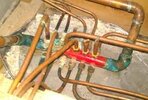We'd have nothing to answer if you knew more

A three bed semi needs around 8kW.
If a combi try to find a boiler that can be range rated to what you need for the heating.
Look at the residual pump head for the boiler at 70%. In 15 and 22mm the head loss around a system is under 1.5m and for microbore unlikely to exceed 2m; if so then you're over-pumping and the delta T closes. You can strangle this at each radiator valve but better to have a pump that can modulate lower otherwise you're whipping the water out the boiler then trying to slow it through each rad.
Delta T pumps have limited use if you're modulating the flow temperature as you're reducing the starting point from which it operates.
Try for a boiler with adjustable anti-cycle delay as you can limit cycling and increase delta T that way.
Study the start up sequence in the manual, even if it's range rated many boilers still start at say 75% of the maximum output before modulating down. 75% of say 20kW is 15kW and the property needs only 8kW and that only when it's -3degrees, Most of the time it's definitely not -3. Try to find a boiler that starts at a percentage of it range rated output then has a timed ramp up.


